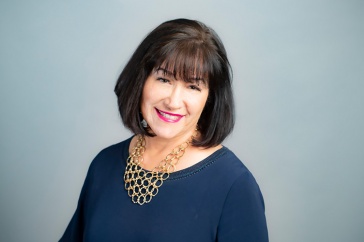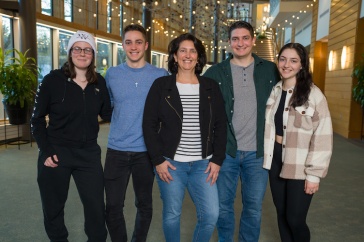
Susan Mercandetti was multimedia long before multimedia became a household word. After jobs in the White House and the Senate, she moved to TV, becoming the first news booker at "Good Morning America" and then a producer for "Nightline" from the show's start in 1979 during the Iran hostage crisis. Next she moved to magazines, as an editor for Vanity Fair and The New Yorker, and then to books as senior editor of Miramax Books and an executive editor of Random House. Now she's back at ABC News as vice president for business development and partnerships. Mercandetti and her husband, Richard Haass, president of the Council on Foreign Relations, live in New York and have a son and daughter in college. She spoke with Jane Harrigan in her office at ABC.
Q: How did the kid in work boots who left Durham for a White House internship find her way to TV?
I arrived at the White House with my newly purchased black loafers and skirt. The guard had my name, and the assistant to the press secretary came downstairs and she knew my name, and I thought, "This is it, the brass ring; I've got it. Now I have to prove I belong here."
For me, TV was the promised land. Someone told me that before you get to heaven you have to go to purgatory, and that was Capitol Hill for me. When we (Ford administration) lost the White House, I knocked on doors and Sen. Ed Brooke hired me. I loved the job, but politics was not my passion.
So I stalked the networks. I would hang around the bars across from ABC and talk to the producers and directors about the news. I was a news groupie. I heard about a job with "Good Morning America," and that led to "Nightline."
Q: Was being a "Nightline" producer as exciting as it sounds?
It was fun and exhilarating and important. We'd wake up in the morning and have a conference call and say, "What's the most interesting story in the world today?" And then we'd go do it. We felt it was our responsibility to bring important stories to life.
Ted Koppel is the most brilliant storyteller there ever was, and we were all his acolytes. The show became my graduate education; every day was a crash course in something.
Q: So why did you leave?
It's hard to have a full life when you work in news. I had no trouble committing to it for many years; it suited my personality so perfectly. Then I met Richard. I was a crazy producer working berserk hours. I had stopped being satisfied with that life. He was 40; I was 38. It was time.
The first morning I woke up with no job, I felt utter panic. I had never not worked since I was 14—never, not for a minute. I remember sitting in my little house in my little den with my coffee cup and clutching the chair thinking, "What have I done?"
I'm a first-generation American. My parents came from Italy. My mother worked in a sweatshop; my father worked in a meat-packing plant. I just always had this yearning, this drive to be part of a bigger world. When I told my mother I was going to take time away from work, she said, "You'll last six days." I lasted four and a half.
Q: Your next few chapters all related to Tina Brown?
The Sunday after I quit Koppel Communications, I had a brunch, and this woman walked in who worked for Tina Brown. We started talking, and she said, "Come meet Tina; she has projects in Washington for Vanity Fair."
Projects? I can do projects. Producers call ourselves "the get s--- done people." That worked for Tina because she was all about making stuff happen. I came up with a million ideas for her, and then I'd find people to do them and then help shape the story. When she went to The New Yorker, she asked me to come with her, and I did the same thing there.
Q: Book publishing is a different world from magazines and TV. How did you break in?
I had always loved the idea of being a book editor but couldn't figure out how to get there. When Tina left The New Yorker to start Talk magazine, I said no, I don't want to do a startup magazine. She said let's start a television wing, and I said no, I don't want to do TV again with two small kids.
Then she said, "Well, there's a small book imprint," and I said BINGO! It was like manna from heaven. Because I didn't have any history in the book business, agents were not coming to me with projects, so I went and got my own. I would go to people I found interesting and say, "Hey, why don't you write a book?" I did that with Tim Russert and with Rudy Giuliani. Later I worked with Queen Noor and Madeleine Albright.
Q: And then you wound up back in TV. What did all your moves have in common?
I loved being a book editor. I still felt like I had so much to learn about the business. But when great opportunities come along, I just say, "Why not?"
Vice president of business development and partnerships at ABC means I work directly for the president of the news division, who is a visionary. I work on growth-related groundbreaking projects like helping to develop Fusion, a cable channel for millennials. ABC and Univision got married and had a baby, and the baby is Fusion.
This is a crazy new challenge unlike anything else I've done. I have never been a suit; I've always been a worker. But everything I've ever done involves telling a story. It was storytelling at the White House, in Senate press releases, at "Nightline," at magazines, in books. (This job) is more of a left-hand turn. It's developing the story of what ABC News can be, beyond a news division.
What gets me up in the morning are ideas and the ability to execute ideas. I feel so grateful that I get to do that. My parents could never have imagined all this for me.
Q: What was your best job ever?
At UNH I went home every weekend to work as a waitress at an all-night diner. It was the ultimate place of great stories. People always want to talk to the waitress at 3 in the morning. How to interact with all kinds of people; how to be fast; how to be clever; how to charm the crusty grill guy so I got my orders first—everything that was important to learn, I learned at the all-night diner.
Originally published in UNH Magazine—Spring 2014 Issue
-
Written By:
Jane Harrigan | Communications and Public Affairs



















































